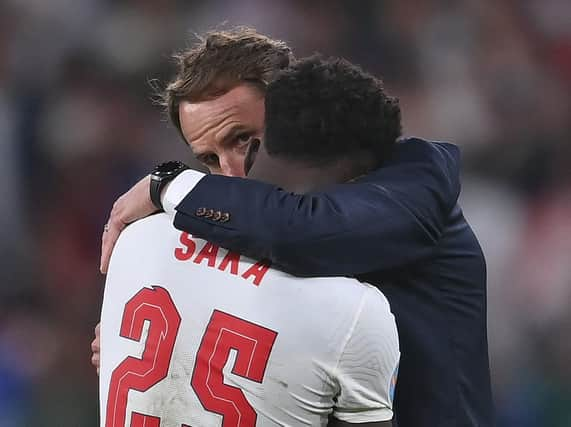How theatre could help tackle racism in this country - Nick Ahad


I reckon that’s what Gareth Southgate might have whispered into the ear of Bukayo Saka on Sunday night. For the rest of the team, more Shakespeare: “all the world’s a stage and all the men and women merely players. They have their entrances and their exits and one man in his time plays many parts”.
Southgate knows that well – consider the part he played in 1996 and the vastly different part he played in 2020. Same stage both times, the Wembley arena, but very different roles.
Advertisement
Hide AdAdvertisement
Hide AdThere is much to talk about with regards to last Sunday night and the fallout, but what business has the Euro 2020 final in the pages of Culture?
It’s the story. Euro 2020 contained a multitude of stories. There was the story of the heroic men on the pitch and their superhuman work off it, the story of the opportunistic politicians who attempted to castigate them early in the tournament only to try to climb on their backs as they progressed ever closer to glory.
The story you might have missed if you only read the sport pages though was a supposed battle: football versus theatre.
On Sunday afternoon, crowds of football shirt wearers were dancing on the roof of the Wyndhams Theatre – a venue shut since March 2020.
Advertisement
Hide AdAdvertisement
Hide AdThe world of theatre, already incredulous to see the streets outside forcibly-shut theatres lined with drunken huggers, went apoplectic. Tom Stoppard’s Leopoldstadt was apparently too dangerous to be viewed by an audience inside the Wyndhams, while on the outside hundreds dancing with their shirts off was considered less dangerous, how?
The deep sadness of it is that theatre could help tackle the vile nastiness that followed Sunday’s penalty shootout.
Those of us who experience it first hand keep trying to convince others that there is an underbelly of racism running through our society. Well, didn’t it expose its disgusting self following Sunday night’s penalty shootout? It needs stamping out, finally, but how to fix the problem?
Theatre might be a place to start. At its best, drama allows a person to see the world through another soul’s eyes. That’s what those people who racially abused players following Sunday’s defeat need to do: learn empathy. Theatre can teach that (if it’s allowed to open).
Advertisement
Hide AdAdvertisement
Hide AdAnd for the England team – this time they exited, but they will have another entrance and they will be playing another part come the winter after next.
Let’s hope it’s a different story next time, in every way.